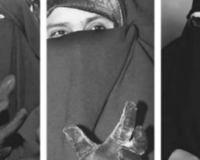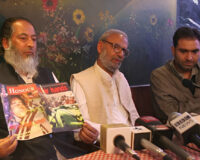Bi-Annual Human Rights Review (Jan – June 2021)
Indian occupied Jammu Kashmir is under unprecedented censorship and this undemocratic forms of muzzling the voices of people has intensified manifold after the revocation of Article 370 and 35(A). The subsequent raids on human rights groups, activists, and journalists have made it more difficult for organizations to work under constant fear and state-enforced silence on the people of Indian occupied Jammu and Kashmir. Under such dire circumstances, reports on human rights violations becomes an inevitable imperative for all organizations working in and outside of Jammu and Kashmir.
The deceased include 13 civilians, 71 indigenous Armed Rebels and 23 Indian occupying forces.
This Bi-annual report prepared by Legal Forum for Kashmir (LFOVK) on human rights violations in Indian occupied Jammu and Kashmir covers the period from 1 January to 30 June 2021. The first six months of 2021 saw India launching an unprecedented level of censorship on all forms of coverage to sustain a particular narrative and curb the reports on human rights violations in the occupied territory. The First six months of 2021 witnessed killing of 23 Indian occupying forces and 71 Indigenous armed rebels besides extrajudicial killing of 13 civilians across the UN designated disputed territory of Indian-occupied Jammu and Kashmir. From January 1 to 30 June 2021, the Indian occupying forces launched the so-called 114 Cordon and Search Operations (CASOs) and Cordon and Destroy Operations (CADOs) which resulted in 29 encounters in which 71 indigenous armed fighters died fighting Indian occupying forces. 23 Indian occupational forces were also killed during these encounters. During encounters, at least 53 houses were vandalized and destroyed by the Indian occupying forces.
J&K experienced a massive surge in coronavirus cases due to the Indian government’s criminal mismanagement of the COVID-19 response otherwise highly militarized region, which had already suffered a debilitating lockdown before the pandemic started. The arbitrary use of the anti-terror laws and the National Investigation Agency (NIA) against Civilian population, human rights defenders and journalists continued in Kashmir despite sustained third wave of COVID-19 lockdown enforced by the government. Even though UN special rapporteurs in three different letters to the Indian government raised concerns about introduction of new laws which may lead to a reduced level of political representation and participation of local groups in the Indian Occupied Jammu and Kashmir, according to UN experts. On Feb 22, 2021, a seven-member team of multiple Special Rapporteurs of the United Nations expressed “deep concerns” over the arbitrary use of the anti-terror laws and the National Investigation Agency (NIA) against human rights defenders and journalists in Kashmir “aimed at discrediting their work. On June 29, 2021, United Nations Secretary General Antonio Guterres, also urged India to end the use of pellets against children in Occupied Jammu and Kashmir and stop associating children with the security forces in any way.
But, as usual offender of international law and agreements, India defied the call from world’s highest office and continued with its war crimes policies in Indian-occupied Jammu and Kashmir. 13 civilians were killed in different violence related accidents included Custodial death of Muhammad Ashraf Sehrai, 77 a Senior resistance leader and Chairman of Tehreek-e-Hurriyat Jammu and Kashmir –a pro-freedom political party which seeks complete freedom from Indian military occupation of Jammu and Kashmir as per the United Nations Resolutions.






